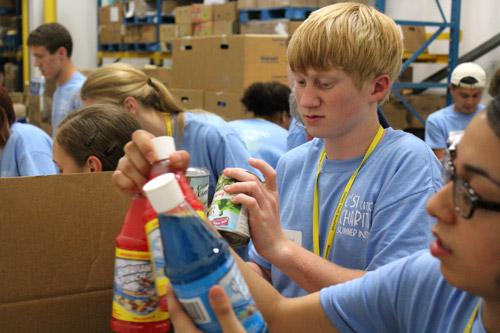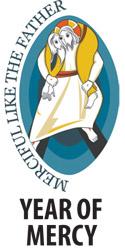

Feeding the hungry is one of the corporal works of mercy. This teaching of Jesus comes from the Gospel of Matthew 25:35 where, in a parable, Jesus says, “For I was hungry and you gave me food, I was thirsty and you gave me drink.”
The responsibility to provide food and drink for those in need is found throughout the Old and New Testaments. For example, in Deuteronomy 15:11, God instructs the Israelites to share freely the gifts of the land with those in need:
“The land will never lack for needy persons; that is why I command you: ‘Open your hand freely to your poor and to your needy kin in your land.’”
In Deuteronomy 24:19-21, we are told that a part of every harvest belongs to the poor: “When you reap the harvest in your field and overlook a sheaf in the field, you shall not go back to get it. ... When you knock down the fruit of your olive trees, you shall not go over the branches a second time. ... When you pick your grapes, you shall not go over the vineyard a second time; let what remains be for the resident alien, the orphan and the widow.”
This practice is known as gleaning. We do this, Deuteronomy 24:19 says, “so that the Lord, your God, may bless you in all your undertakings.”
There are moments in Scripture where feeding the hungry takes on a miraculous nature. For example, in 1 Kings 17:10-15, the prophet Elijah repays a woman’s generosity by promising that “the jar of flour shall not go empty, nor the jug of oil run dry” until the famine ends.
In 2 Kings 4:42-44, the prophet Elisha feeds the masses on 20 barley loaves. Then, of course, there is the example of Jesus feeding the 5,000 on five loaves and two fish (Luke 9:10-17).
What is important to understand in all of these readings is that there is more going on than simply providing nourishment to someone in need. Each of these events shows God’s amazing power at work.
When we feed the hungry we come in touch with the divine. We participate in God’s ongoing work of mercy, which each of us experiences in some way.
When we open our hearts and act with generosity toward those in need, we allow God to work through us.
And when that happens, amazing things occur far beyond our own limited imaginations, as Abraham discovered when he fed two travelers in Genesis 18:1-15 and became the father of a nation. The person you are feeding is a representative of God.
As Jesus says in Matthew 25:40, “Amen, I say to you, whatever you did for one of these least brothers of mine, you did for me.”
Now that is food for thought.
Please read our Comments Policy before posting.
Article comments powered by Disqus What would Christ the King be doing today?
What would Christ the King be doing today?
 Two get state honors for works of mercy in volunteering
Two get state honors for works of mercy in volunteering
 Year in Review 2016: a merciful universal Church
Year in Review 2016: a merciful universal Church
 Jubilee year ends, but mission of mercy never does
Jubilee year ends, but mission of mercy never does
 Light of Christ is more powerful than darkness
Light of Christ is more powerful than darkness
 Winning directory photo honors Our Lady of Guadalupe
Winning directory photo honors Our Lady of Guadalupe
 St. Paul says: How does the Bible define love?
St. Paul says: How does the Bible define love?
 6 steps to getting married in Diocese of Little Rock
6 steps to getting married in Diocese of Little Rock
 Most frequently asked questions on Catholic marriage
Most frequently asked questions on Catholic marriage